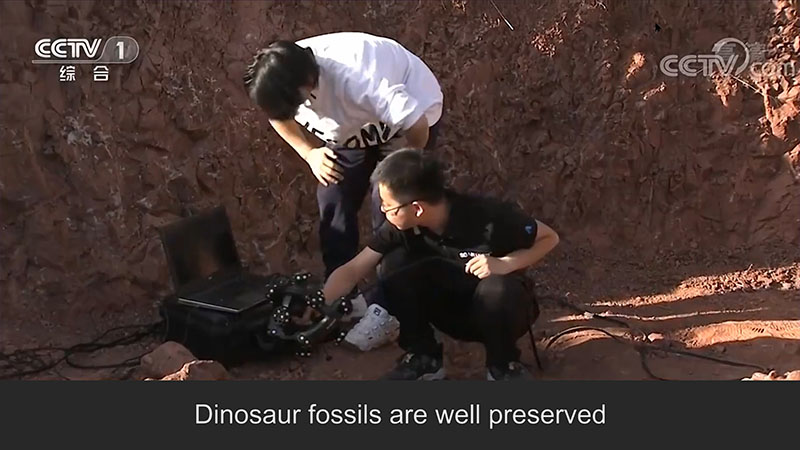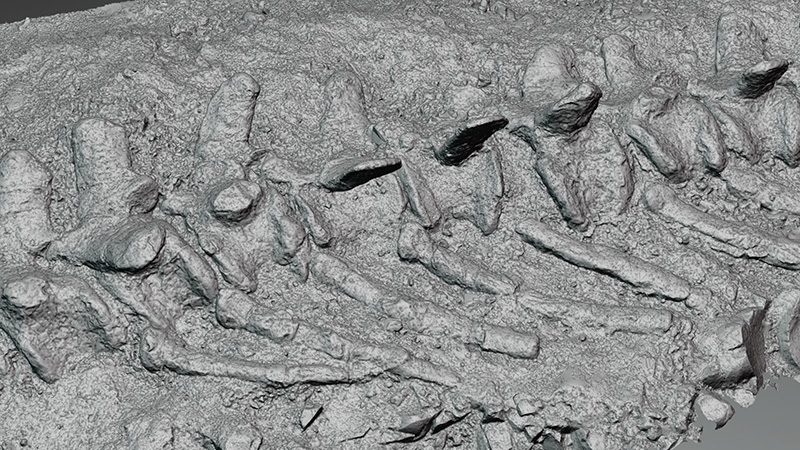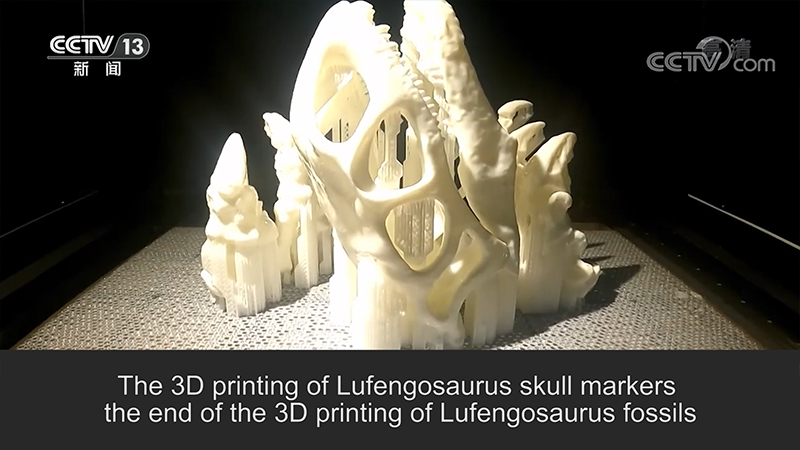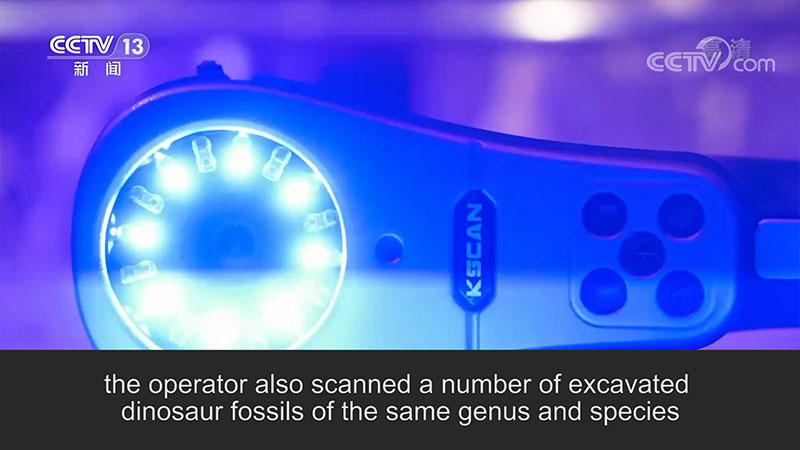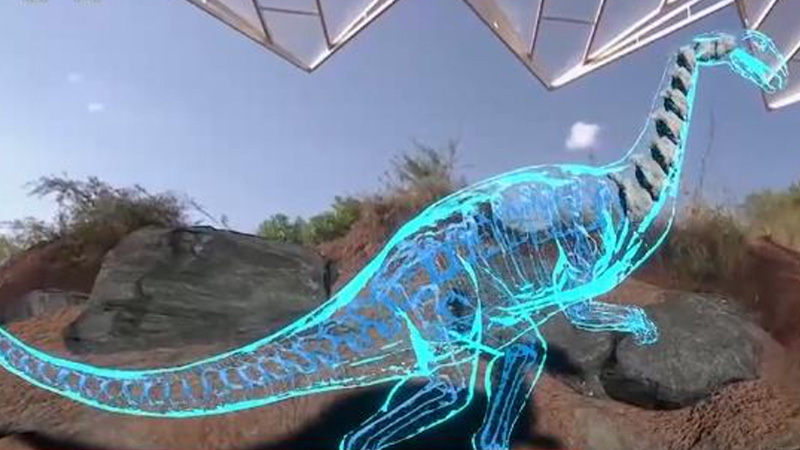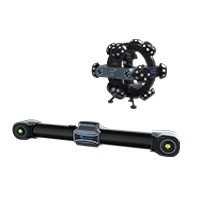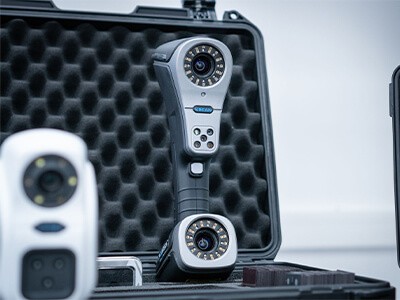A skeleton of a juvenile dinosaur from the early Jurassic period, around 190 million years ago, was discovered in September in Lufeng, Yunnan Province, China. Its excavation has been reported by China Central Television (CCTV) in its 7-day live broadcast “Return to the Jurassic Period-Yunnan Lufeng Dinosaur Fossil Scientific Excavation”. Scantech was honored to be invited to participate in the digital 3D scanning and restoration of the dinosaur.
With Scantech’s 3D scanner TrackScan, we captured the textures and 3D data of dinosaur fossils precisely. A fossil model was then created for exhibition thanks to 3D modeling and printing. With a 3D printed dinosaur skeleton, scientists and researchers can deduce the morphological evolution of Lufengosaurus that lived 190 million years ago.
The live broadcast shows our commitment to the mission of the Fifteenth Meeting of the Conference of the Parties to the Convention on Biological Diversity (COP 15) scheduled on 11th October 2021. It highlights the theme of COP 15 “Ecological Civilization: Building a Shared Future for All Life on Earth”.
Dinosaurs in China
Lufeng County in southwest China’s Yunnan Province is known as the “hometown of dinosaurs”. A nearly intact dinosaur skeleton was discovered there and named “Lufengosaurus” by Yang Zhongjian (C. C. Young), the founder of vertebrate paleontology in China in 1938. It is the first dinosaur to be assembled and mounted for display in China.
The dinosaur fossils reported this time were exposed after heavy rains washed the area and were first discovered by some villagers. Paleontologists from the Chinese Academy of Sciences and local dinosaur fossils’ protection center have been sent to the field to conduct studies into the skeletons. Following the steps of CCTV, let’s explore the mysterious prehistoric world.
3D scanning helps interpret the ancient history
At the excavation site, archaeological workers carried out the whole process of rescue work from excavation, restoration, cleaning, protection to presentation. Scantech helped archaeologists accurately obtain 3D data of Lufengosaurus and restore it digitally. In this way, we had the opportunity to contribute to the protection of biodiversity advocated by COP15.
During the process of 3D scanning and restoration, we were confronted with different challenges:
– The changing lighting conditions outdoors especially strong sunlight causes problems like overexposure.
– Besides, the bony structure of this 8-meter dinosaur is damaged which results in numerous textures after hundreds of millions of years of weathering.
– As the fossils are rare and precise, it is required that operations cannot cause any damage to the fossils. All these challenges were overcome with our high-tech 3D scanner.
A Scantech technician brought our portable and independently-developed TrackScan 3D system to the excavation site and performed on-site 3D scanning. Thanks to automatic and intelligent optical tracking and non-contact measurement, we helped 3D scan the fossils without sticking markers.
With a scanning rate of up to 1.9 million times per second, we obtained the whole 3D data of dinosaur fossils quickly. All the textures and intricate details of the dinosaur fossils were captured at an accuracy of 0.025mm. Our technician also scanned multiple dinosaur fossils of the same genus that had been excavated before to model the missing bones.
3D scanning and printing bring lufengosaurus back to life digitally
It is the first time that 3D scanning and printing have been adopted in China for dinosaur excavation. With a portable 3D laser scanner, we supported scientists to capture precise 3D data of fossils including the cracks and textures formed during fossilization.
The data was then converted into a 3D model so that we can appreciate the original appearance of the dinosaur.
Before the emergency of 3D printing, it is hard for scientists to restore a 1:1 sized dinosaur skeleton. The manual modeling process is costly and time-consuming and it cannot be done without compromising the original structures and textures of the fossils unearthed. The dinosaur excavated is known to be 8 meters long and 3 meters tall. It has about 300 bones of various sizes and shapes, with a volume of nearly 30 cubic meters and a weight of 3000-5000 kg.
Despite the challenges it brings, all details of the fossils, even subtle cracks, were truly restored through 3D scanning. At the same time, the latest photosensitive resin with high tensile strength was used as the printing material for full-scale 3D printing. The printed model of the dinosaur skeleton is only about 300 kg.
It took only 20 days to create this 8-meter-long dinosaur model from 3D scanning to 3D printing for the exhibition of lufengosaurus at COP15. These technologies contribute to scientific investigation so that it can be more precise and efficient. This is a way to digitize and modernize the workflows of archaeological excavation.
The significance of 3D digitization of dinosaur fossils
With the precise 3D printed dinosaur model, archaeological workers can intuitively observe the appearance of the dinosaur and obtain more information for further study. They’re going to study its life, its relations with other dinosaurs, and its living environment.
Besides, 3D digitization can be applied to site protection, research and restoration of paleontological fossils as well as modeling, display for museums and so on.
The 3D digitization of lufengosaurus through 3D scanning presents stunning and interesting AR images for an intuitive and interesting experience for the audience.
Interpret ancient mystery for building a shared future
Dinosaur fossils enable us to explore the past, present, and future of the evolution on earth. Emerging technologies like 3D scanning and 3D printing also carry a big weight in exploring this world. Meanwhile, thanks to the efforts of researchers and experts, we could embark on a scientific journey to explore the prehistoric world 200 million years ago.



